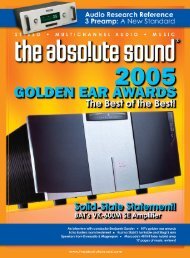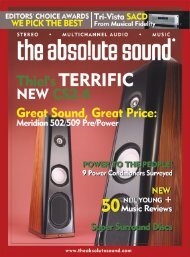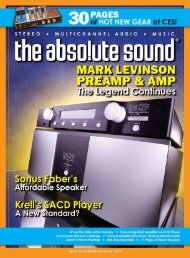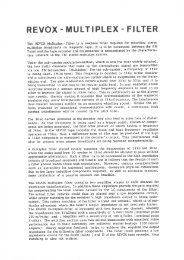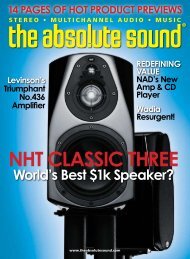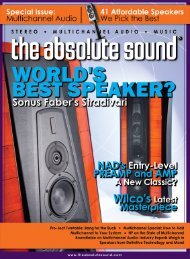You also want an ePaper? Increase the reach of your titles
YUMPU automatically turns print PDFs into web optimized ePapers that Google loves.
she vamps like a torch singer at the opening<br />
and then picks up the tempo to run through<br />
a series of Baroque-tinged variations with<br />
puckish humor. The Air from the Goldberg<br />
Variations begins with directionless doodling<br />
before settling into sprightly, light-fingered<br />
variations that lead to a much-decorated<br />
statement of the theme and a coda with more<br />
than a whiff of ragtime.<br />
The engineering is true to her sound,<br />
which can get edgy, and encompasses her<br />
wide dynamic range, from the powerful<br />
opening of the D minor Toccata BWV 565<br />
to the wispiness of the slower pieces. It’s<br />
also well-detailed, as in the fleet-fingered<br />
articulation of the Italian Concerto’s Presto.<br />
But for spiced-up Bach, stick with Jacques<br />
Loussier. DD<br />
Further Listening: Montero: Recital;<br />
Jacques Loussier: Plays Bach<br />
Sting: Songs from<br />
the Labyrinth.<br />
Music by John Dowland. Edin<br />
Karamazov, lute. Sting and<br />
Karamazov, producers; Donal<br />
Hodgson, engineer. Deutsche<br />
Grammophon 06025 170 3139.<br />
Who knew Gordon Matthew Sumner,<br />
known to the multitudes as Sting, plays the<br />
lute. I carefully checked my old Police LPs<br />
for lute credits. Nothing. It turns out that<br />
Sting is fairly new to the instrument. A few<br />
years back, a member of his band gave him<br />
a gift of a custom-made nine-course lute and<br />
now the rock star has released a disc of music<br />
by English Renaissance composer John<br />
Dowland.<br />
Actually, most of the lute playing here<br />
comes courtesy of the Serbian musician Edin<br />
Karamazov, who served as a mentor to Sting.<br />
Karamazov’s playing is the best part of this<br />
release, and a little hyperkinetic for some<br />
tastes—he’s no Paul O’Dette or Anthony<br />
Rooley—but accomplished and propulsive.<br />
Sting plays only in the background beneath his<br />
portentous recitation of excerpts from a 1595<br />
letter Dowland wrote to Queen Elizabeth’s<br />
Secretary of State, and in one duet. But the<br />
vocals are all Sting, and Elizabethan airs are<br />
not his strong suit.<br />
His Dowland is at once anachronistically<br />
overblown and strangely flat and<br />
unresponsive to the texts. He sees Dowland<br />
as “an archetype…of the alienated singersongwriter”<br />
but these performances lack<br />
the sense of profound introspection that<br />
so many others have brought to the music.<br />
Compare Sting’s version of “In darkness let<br />
me dwell” to that by the late Alfred Deller.<br />
The latter’s quiet, soulful rendition has plenty<br />
of emotional range but seems directed to one<br />
or two listeners—maybe just to himself on a<br />
moonless, desperate night. Sting’s playing to an<br />
arena-sized crowd; his phrasing is frequently<br />
coarse and his shaping of the songs awkward.<br />
Worse are the couple of partsongs on which<br />
he overdubs all the voices; these come off<br />
dangerously close to bad 70s art-rock.<br />
The sound is very close up and aggressive,<br />
airless with harsh vocal sibilants and too much<br />
extraneous noise from the lutenist sliding and<br />
scraping the strings of his instrument. A bad<br />
idea, poorly executed. AQ<br />
Further Listening: Dowland: Airs &<br />
Partsongs (Deller Consort); Dowland:<br />
Honey from the Hive (Kirkby/Rooley)<br />
(SACD)<br />
December 2006 The Absolute Sound 141



